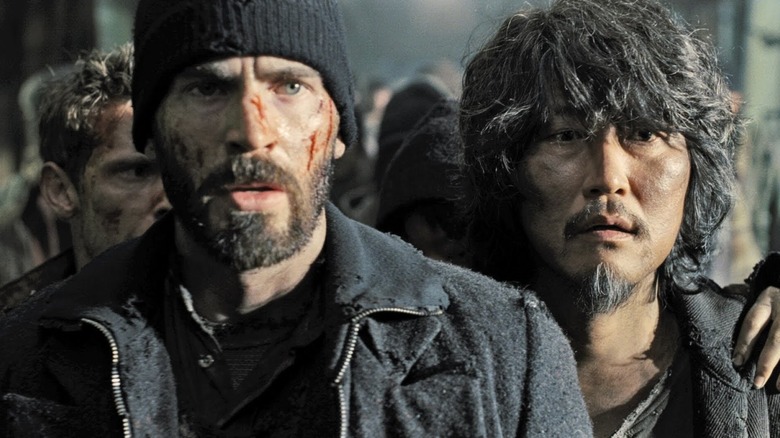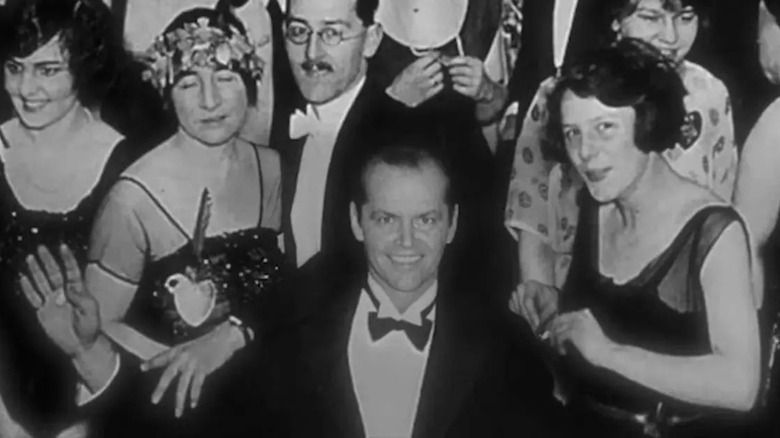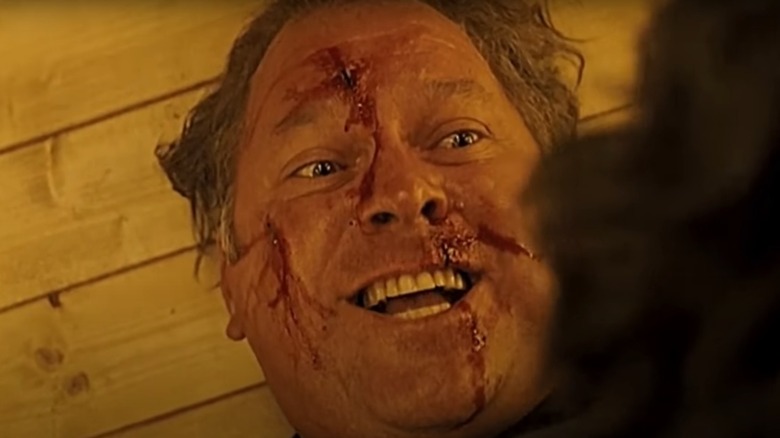Snowpiercer Features A Small Tribute To Stanley Kubrick's The Shining
Oscar-winning director Bong Joon-ho is widely known to have a deep bench of cinematic knowledge and influences. It's consequently unsurprising that, in his foray into sci-fi action with "Snowpiercer," the director found a way to pay subtle tribute another classic film about, deep inhale, characters surviving sometimes axe-wielding antagonists in an isolated location while surrounded by inhospitable, sub-zero snow. In addition to some of these chilling basic similarities, "Snowpiercer" also has a rather rare needle drop that pays homage to one of the most haunting scenes in "The Shining," a film whose slow-motion blood elevator scene made Bong Joon-ho cry.
In a particularly tense "Snowpiercer" action sequence, the scene's resolution features rising jazz that's hauntingly associated with the final scene of Stanley Kubrick's influential Stephen King adaptation. The song, "Midnight, the Stars and You," was most notably released in 1934 by Ray Noble and his Orchestra, and is so memorable in its "The Shining" usage that subsequent on-screen appearances to the classic track are typically in reference to it — see 2018's "Ready Player One" and 2019's "Doctor Sleep" and "Toy Story 4," for just a few examples.
Come reference us Danny, forever and ever and ever
In Stanley Kubrick's "The Shining" adaptation, troubled writer Jack Torrance (Jack Nicholson) and his family move into the isolated Overlook Hotel as its winter caretakers. Jack is driven progressively, murderously insane by the evil hotel in its quest to entrap Jack's psychic son Danny (as it has time and again used occupants and trapped souls in its history). At the film's end, Jack chases Danny into a snowy hedge maze before getting lost and freezing to death in the sub-zero weather. The final shot situates the audience back in the hotel as the camera slowly, methodically pushes in on a wall of photos in the hotel's infamous Gold Room. "Midnight, the Stars, and You" begins to play as the camera glides forward through a door frame, centering on a picture of the hotel's 1921 July 4th Ball with Jack Torrance standing front and center, sporting an unhinged wave and smile.
Bong Joon-ho's film "Snowpiercer" follows the titular train as the last bastion of humanity on an apocalyptically sub-sub-zero Earth, forever circling the globe and keeping the remnants of humanity alive on an inhospitable planet. The train's rigid class structure, between the upper class at the train's head versus the working class spread throughout its tail, provokes an uprising of the lower classes, lead by Curtis (Chris Evans) and viciously opposed by the train's powers-that-be. One of the latter's major enforcers, Franco the Elder (Vlad Ivanov), chases Curtis into and through a sauna car. He knocks Curtis out in the scuffle, kills two of Curtis' working-class soldiers, and a battle-crazed Franco looks over his fallen victims and the train's deceased soldiers as "Midnight, The Stars and You" begins to slowly play. He checks the rest of the sauna, while Curtis' ally Namgoong (Kang-ho Sang) and the latter's daughter Yona (Ah-sung Ko) surprise Franco, allowing Curtis to finally get the drop on the nigh-unbeatable thug. Before dying, his final expression turns to a murderous, unhinged grin as the track plays over the gruesome scene.
It's a small, subtle tribute over a scene revealing the final fate of a protagonist-hunting villain in service to an oppressive structure (though, of course, Snowpiercer isn't the sentient, evil, haunted location that The Overlook is), and it's a lovely nod from one world-class filmmaker to the legacy of another.
Be a shoe, dancing to this classic reference
Many uses of "Midnight, The Stars and You" are clear and overt references to "The Shining," directly containing elements of the scene or some sort of callback to that film. The "Snowpiercer" nod is much, much more subtle. In "The Shining, the song accompanies a shocking conclusion to a sudden and unsettling ending. Jack Torrance seems an unhinged man stuck in time, given that said party happened long before Torrance's recent stay at the infamous Overlook (prefigured by the ghastly Delbert Grady earlier telling Jack he's "always been the caretaker" of the Overlook). Is Jack doomed to reincarnate as yet another troubled, violent man in perpetual service to the hotel's dark desires, and has he been there before? Is the well-populated photo an eternal log of all the souls the Overlook as corrupted and claimed, locked in eternal tormenting service? That's complicated and widely debated, but what's certain is that "Midnight, The Stars and You" is now long associated with that moment in horror history.
In "Snowpiercer," the music starts playing just as Franco looks over the corpses of his victims, wipes his face, and continues to search each sauna. This isn't the Overlook and Franco isn't an alcohol-weakened Jack Torrance under supernatural control, but Franco is a murderous hunter who kills in service to a "place" and an order. In this case, it's the train, Snowpiercer, and its tightly controlled hierarchical order. His very final reaction before death confirms his gleeful and unhinged dedication — the kind of murderous grin that would make Jack Torrance proud.
In both cases, the song is played over the image of a man whose obsessive murderous tendencies (on behalf of a structure, no less) results in his doom. Both scenes see said man sent off with a final, unsettling grin that says they're still having the time of their lives in their final sacrifice to evil. The song itself is an innocuous ode to surrendering one's whole life and love on behalf of someone ... or in this case, perhaps, some totalitarian evil.


